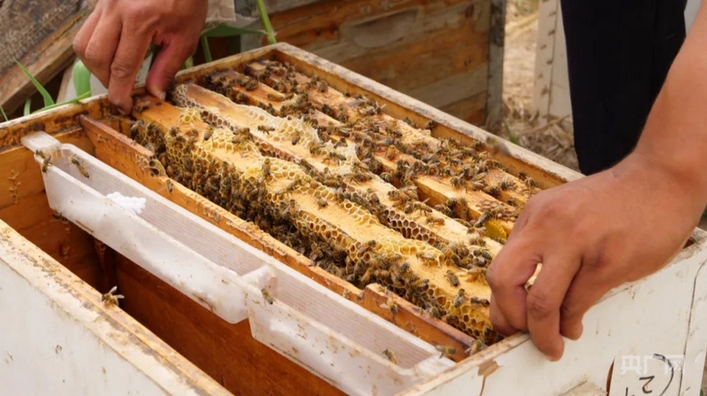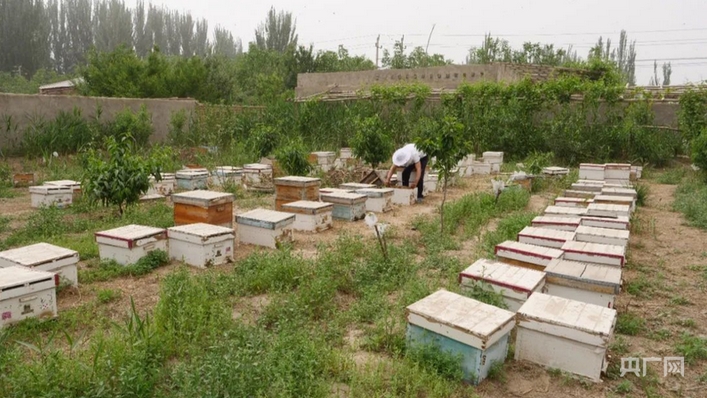Sweet honey is the reward of hardworking bees, just as a prosperous life stems from diligent hands. In recent years, Kasapumaili Village in Wujireke Township, Kargilik County, northwest China’s Xinjiang Uygur Autonomous Region, has made specialty industries a key driver of rural revitalization. By systematically developing beekeeping, the village has found a unique development path.

Photo shows Abdumijit Sadir carefully holds a honeycomb. (Photo by Akramjan Tusunjan/China National Radio)
At villager Sadir Sadih's beekeeping area, rows of beehives sit neatly in the yard, while bees flit busily among blooming flowers, collecting nectar. Known throughout the village as a successful beekeeper, Sadir Sadih and his family have built up 11 years of experience in the trade. Thanks to these bees, their household income has grown significantly.
Wujireke Township has consistently focused on helping farmers develop specialty breeding. The secretary of the village Party branch has guided local beekeepers in refining large-scale beekeeping techniques, improving honey yields, and carefully assessing economic return, laying a strong foundation for Kasapumaili Village's thriving beekeeping industry. With the village Party branch's targeted support, Sadir Sadih's family has upgraded their methods and expanded operations, steadily increasing their beehives from just over 100 to more than 350.

Photo shows Abdumijit Sadir's beekeeping area. (Photo by Akramjan Tusunjan/China National Radio)
The wooden lid of beehive was carefully raised, and Abdumijit Sadir, Sadir's son, watched the honeycomb intently. Morning sunlight illuminates hundreds of worker bees dancing in orderly patterns across the combs, their hexagonal cells filled with honey that glows like amber. Sadir Sadih relocates hives from April to August annually to match the flowering seasons of peach, apricot, locust, and oleaster trees. These pristine, pesticide-free blooms yield honey priced at 30 to 80 yuan per kilo, generating roughly 300,000 yuan (about 41,570 U.S. dollars) yearly.

Photo shows bottled honey. (Photo by Akramjan Tusunjan/China National Radio)
"We've been keeping bees for 11 years," Abdumijit shared. "With the village and government's help, I now manage 250 high hives and 100 standard hives, producing nearly two tons of honey every two weeks. Customers get it bottled and filtered right here. There are no additives, just pure honey. Life keeps improving. But real success means lifting others too. Many neighbors now work with us, and I teach them everything I know, so we all prosper together."
The Sadir family's journey from novices to beekeeping pioneers reflects a decade of craftsmanship and determination, turning effort into golden harvests. Their story now inspires Kasapumaili Village's revitalization, encouraging more families to embrace this sweet enterprise and paint a thriving future.
(Source: China National Radio, Reporter: Jiang Rong, Correspondents: Akramjan Tusunjan and Liu Tianjian)









